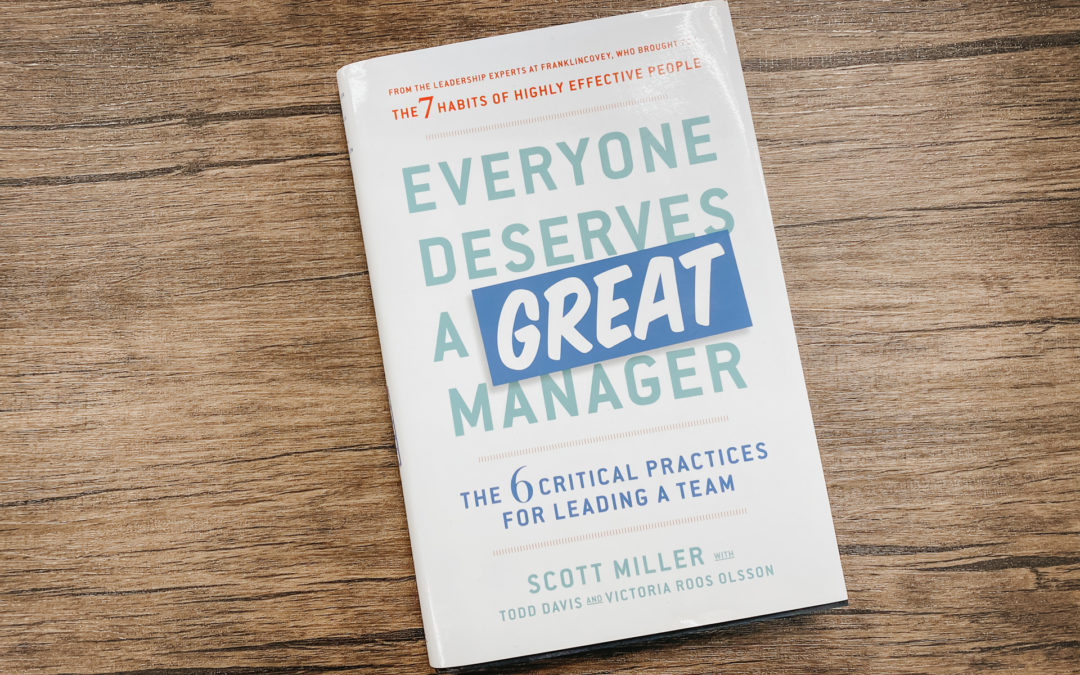When I spoke with Scott Miller, Executive Vice-President and Chief Marketing Officer at Franklin Covey, I must admit that I was more than a little excited to get a chance to speak with him about his rather unconventional leadership book.
Everyone Deserves a Great Manager: The Six Critical Practices for Leading a Team, which debuted at number three in the Wall Street Journal and has since become one of their bestsellers, is “about changing your mindset” when it comes to true leadership. But does it really say anything fresh and new?
Actually, it does, and after reading it myself, I’m even more excited to share my interview with Scott Miller with you. You’re sure to take away a fresh perspective just like I did.
Entering a Leadership Role: Reflecting on Our True Motivations
I started the interview by inviting Scott to tell us why he “crashed and burned as a manager” when he entered his first leadership role. With surprising candor, he revealed his motivations for taking the position:
“I […] knew that if I wanted to make more money, if I wanted to get promoted, if I wanted a better business card or title, I had to lead people. So for me there […] wasn’t an option. It was just a natural gravitational pull.”
But despite his success in prior roles, Scott admitted he wasn’t ready for the job of being an effective leader. He went on to tell me that “the Harvard Business Review published a study recently that said that the average age someone is promoted into their first management role is age 30, which actually applies with me.”
Unfortunately, though, the study also revealed that their first leadership management training is at age 42. This means that “there’s a 12-year gap of people kind of wandering aimlessly in the desert, wreaking havoc on people because they don’t know what to do.”
This is because most people are promoted into a management role due to their success as an individual. The shocking truth? Most don’t realize, upon accepting a leadership role, that the skills needed for individual success are the “opposite skills of what makes you a great […] leader.”

He admitted that upon receiving his promotion:
Nobody sat me down and said, “Scott, here are the eight things you do really well. Seven of these you’ve got to stop doing tomorrow, and here are eight or nine new skills– that you probably don’t fully appreciate, or understand, or even know how to do– that you’re going to need to grow into.”
Talking Through the Blind Spots: Misconceptions about Leadership
As we began to dig deeper into our interview, leadership misconceptions came up. Scott admitted that he had many, but I’m sure he’s not alone.
It seems that most of the following misconceptions are common to those entering leadership roles:
#1 We are all trying to manage our own careers.
When we’re focused on managing our own career, we lose track of those we’re supposed to lead. Therefore, our own career aspirations need to be moved to the back burner.
#2 We assume our current skills will translate to our new role.
Scott said, “When you become a leader, nobody sits you down and says to you, ‘Congrats on all the skills you’ve earned. By the way, those things probably aren’t going to serve you well in leading people. So stop doing all these things and start doing all these things.’”
#3 We expect to create engagement in those we lead.
Leaders don’t create engagement. Instead, they create a culture where people choose a high or low level of engagement. A true leader doesn’t seek to control.
#4 We expect to be the smartest in the room.
I must admit that I was surprised when Scott admitted that he has learned that, instead of being threatened by the intelligence of those he leads, he should have the “maturity, self-awareness, and self-confidence” to hire those more capable than he is. He said, “As a leader, your job is to constantly be thinking about how [you can] magnetize the best possible talent not just to come to the company, but to stay in the company.”
#5 We expect to clone ourselves.
When we approach a leadership role, we can tend to assume that we should create a group of people exactly like ourselves, but this perspective only reveals our pride. People have varied gifts, talents, and perspectives, and expecting to steer them into our way of thinking is not true leadership.
#6 We think it’s all about us.
Scott said that, at the transition point between an individual role and a management role, we need to realize that we’re “no longer […] responsible for getting results on [our] own, that now [our] job is to get results with and through other people.” And the true lesson in this is humility– that we can’t get it done by ourselves anymore.
A Sneak Peek: Effective Leadership Practices
We didn’t have much time left, but I wanted to hear Scott Miller’s in-person take on some of the practices laid out in his book. Some of them might surprise you.
- Hold Regular One-on-Ones. But instead of owning it, let your team member run the show. Scott emphasized, “It’s your team member’s meeting. You don’t call it. They call it. You don’t schedule it. They schedule it. You don’t create the agenda. They create the agenda. You don’t lead it. They lead it. You don’t talk 80 percent of the time. They talk 80 percent of the time.” Why do this? Scott says that, as leaders, we are used to conditioned to solve problems, but when we do, we undermine our team member’s ability to grow into their role.
- Lead with Understanding. “People quit their bosses, not their jobs.” What a poignant statement. Scott went on to say, “If people feel like their leader cares about them and loves them, they don’t take the call from the LinkedIn recruiter. I say that with some gravity but I mean it with enormous passion and credibility. That has been my experience.”
- Give and Take Feedback. Scott emphasized the importance of giving pointed feedback to team members. It seems easy, but we tend to “let things slide” or, on the other end of the spectrum, be overly critical. Both aren’t effective. A good leader can also take feedback from his or her team.
- Lead Your Team to Be Open-Minded About Change. Instead of protecting your team from change, approach it with openness and candor. Allow your team to ask questions and give input. This will create a “nimble” and “prepared” team when mandatory change inevitably comes.
How to Learn More About Being a “Great Manager”
Of course, the practices above are healthy and meaningful for every good manager to implement, but there are so many more great tips and strategies outlined in Scott’s book. If you’d like to learn more about what Scott has learned in his years as a leader, get ahold of his book, Everyone Deserves a Great Manager: The Six Critical Practices for Leading a Team, and give it a read.
